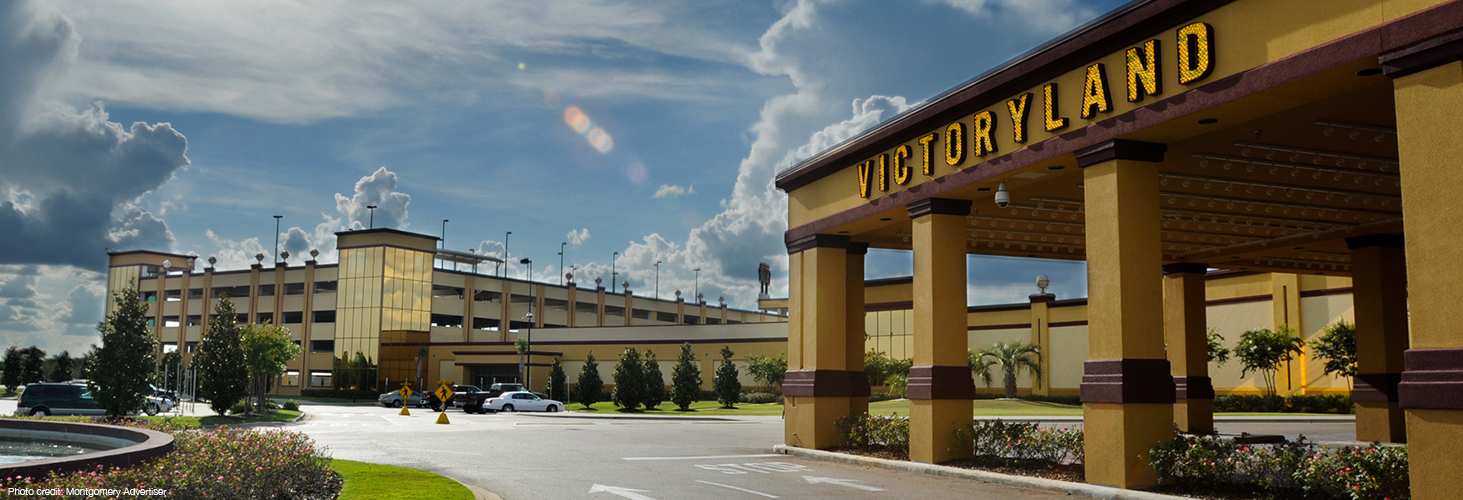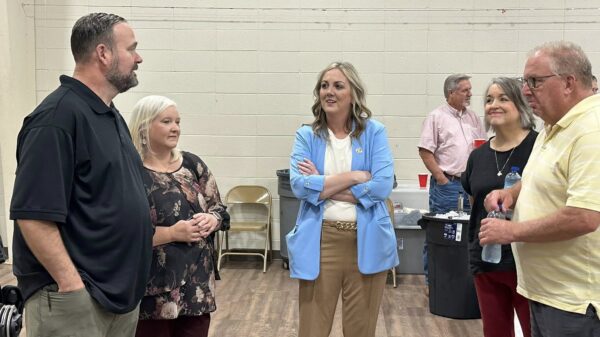By Brandon Moseley
Alabama Political Reporter
On Friday June 26, Alabama Attorney General Luther Strange appealed a decision by Circuit Court Judge William A. Shashy that dismissed the AG’s case against gambling magnate Milton McGregor and his VictoryLand Casino and Dog Track in Macon County.
Judge Shashy wrote in his ruling, “The state could not and did not offer any substantive reason why it permitted this State of affairs to continue at other facilities, while taking its present stance against the same operations at Victoryland…The propriety of the State of Alabama electing to currently pursue action against only one facility is of great concern. It is apparent at the present time that the State of Alabama is cherrypicking which facilities should remain open or closed. This Court refuses to be used an instrument to perpetuate unfair treatment,”
Judge Shashy questioned why the Poarch Band of Creek Indians (PCI) were allowed to run electronic bingo games in Wetumpka, Montgomery, and Atmore, while VictoryLand was closed down for doing the same things. Shashy also referenced operations outside of Dothan and in Greene County.
The ruling has opened up the possibility that Milton McGregor could possibly reopen his embattled VictoryLand Casino off of I-85.
Alabama Attorney General Luther Strange (R) said, “I am surprised at the court order because it fails to address the key question posed by both parties which is whether the VictoryLand gambling machines are illegal. We’re reviewing the order to determine how best to settle the issue once and for all.”
The ruling opened up the likelihood that McGregor was entitled to the return of his 1,615 electronic bingo machines and $263,105.81 in cash the state seized when they raided VictoryLand during the 2013 raid. By appealing the ruling prosecutors hope to take that decision out of Judge Shashy’s court room.
Alabama Governor Robert Bentley (R) is on the record as opposing casino gambling; but he is also dealing with a financial crisis in the state’s general fund and had asked the AG’s office to leave gambling cases to the county district attorney’s office because of cost issues.
Senate President Pro Tem Del Marsh (R-Anniston) has cited the state’s growing litigation costs in the ongoing as one reason for passage of his plan to legalize not only electronic bingo but also class III table gaming at McGregor’s two facilities: VictoryLand and the Birmingham Race Course as well as at Greenetrack, the PCI casinos, and the Mobile Race Track. Senator Marsh cites an Auburn University in Montgomery study that claims such a plan could create 11,000 jobs and with a lottery would generate enough recurring revenues to solve the State’s general fund crisis.
Marsh’s plan however has fallen out of favor with the Governor and many legislators who are now openly discussing a new tax on every non-alcoholic beverage sold in the state of Alabama, a regressive plan that would hit families the hardest.
House Minority Leader Craig Ford (D-Gadsden) supports the Marsh plan or something similar. Rep. Ford wrote recently, “Whether we like it or not, Alabamians are spending their money on gambling. State leaders have wasted millions of taxpayer dollars and thousands of hours of law enforcement’s time trying to fight gambling, but gambling still takes place in Alabama every single day. I deeply respect Gov. Bentley, and have no doubt that he believes opposing a gambling bill is protecting the people of Alabama. But opposing a gambling bill isn’t protecting the people of Alabama. It’s protecting gambling! It’s protecting the gambling interests from competition and paying taxes on their profits, and sending millions of our dollars to other state’s to play their lotteries instead of keeping that money here in Alabama.”
The VictoryLand electronic bingo hall and resort hotel was the largest employer in Macon County and County officials would like to see the facility reopened. They and VictoryLand maintain that an amendment to Alabama’s 1901 Constitution specifically applying to Macon County allows VictoryLand to legally operate bingo: both the paper card game and the much more popular electronic version.
McGregor’s longtime attorney, Joe Espy said in a statement after the ruling by Judge Shashy: “Evidence in this case made it clear that Macon County voters authorized electronic bingo in a manner that has been established by Alabama law and that must be respected under Alabama law. The decision today upholds the rule of law.”
AG Strange has attempted to bring action against the Poarch Creek’s casinos; but has been hampered to this point by the US Bureau of Indian Affairs which claims both jurisdiction and that the Indians are not doing anything wrong. Under Indian Gaming legislation passed during the administration of President Ronald W. Reagan (R) lawfully recognized native American tribes can operate any form of gaming that the State allows other entities to conduct. When Macon and Greene County expanded into the electronic bingo business, PCI followed. In Alabama Governor Bob Riley’s (R) second term, as gaming establishments were popping up all over the state, he started a task force headed by former Mobile District Attorney John Tyson (D). Tyson and Riley maintained that even where bingo was authorized it was only a card game and could not be played electronically.
Then Attorney General Troy King (R) strongly disagreed with Riley and Tyson’s legal interpretations on what is bingo and whether or not the constitutional amendments in Macon and Greene County allowed the gaming that was played there. The task force closed facilities across the state until Gov. Bentley was elected and shut down the Governor’s gambling task force. However former Washington lobbyist Luther Strange had defeated King in the GOP primary in that same election and Strange took up where Riley and Tyson left off.
In December 2012 McGregor attempted to reopen VictoryLand after he was found not guilty on federal charges of allegedly engaging in a conspiracy with Dothan’s Country Crossings owner Ronnie Gilley to bribe state Senators into supporting a 2010 gambling bill, which passed the Senate but died in the House after the FBI made the corruption allegations public. Gilley and some of the alleged co-conspirators pled guilty in exchange for leniency and went to federal prison. McGregor and the four indicted state senators were found not guilty on all the charges despite testimony by Gilley and then State Senator Scott Beason (R-Gardendale) who had worn a wire in the State House as an FBI informant. After just a couple of weeks in operation, AG Strange raided VictoryLand in early 2013, beginning this current court saga.
Ironically PCI was originally able to go into business in Alabama because it was entitled under federal law to do anything that McGregor and Greene Track were doing. Now Judge Shashy has dismissed Strange’s charges against McGregor on the grounds that it is not fair that he can’t do what the Indians are now doing.
Espy said on Thursday, “Today’s ruling assures equality to the people of East Alabama and confirms the very basic principle that all people and businesses must be treated fairly. This decision does not in any way contradict previous court rulings.”
It is possible that if the court takes up the AG’s appeal that this case could ultimately go all the way to the Alabama Supreme Court.























































